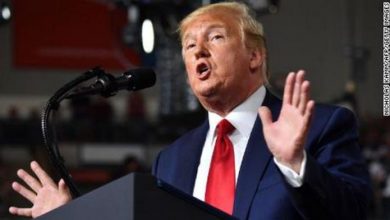International
Parliament suspension sparks furious backlash

The prime minister’s decision to suspend Parliament has prompted an angry backlash from MPs and opponents of a no-deal Brexit.
It sparked protests across the country, a legal challenge and a petition with more than a million signatures.
The government said the five-week suspension in September and October will still allow time to debate Brexit.
Commons leader Jacob Rees-Mogg said the outrage was “phoney”, and that the move was “constitutional and proper”.
“The candyfloss of outrage we’ve had over the last 24 hours, which I think is almost entirely confected, is from people who never wanted to leave the European Union,” he told BBC Radio 4’s Today programme.
“This is the greatest period of anger for them, or of confected anger, because after 31 October we will have left,” he added.
Cabinet minister Michael Gove added the suspension, which was approved by the Queen on Wednesday, was “certainly not” a political move to obstruct opposition to the UK leaving the EU without a deal.
But Ruth Fox – director of parliamentary experts the Hansard Society – said this prorogation was “significantly longer than we would normally have” for the purpose of starting a new parliamentary session.
Ms Fox told BBC Radio 4’s Today programme that, depending on the day the suspension began – and on whether MPs would have voted to have a party conference recess at all – the prorogation could “potentially halve” the number of days MPs have to scrutinise the government’s Brexit position.
On Wednesday, Prime Minister Boris Johnson said a Queen’s Speech would take place after the suspension, on 14 October, to outline his “very exciting agenda”.
He said he did not want to wait until after Brexit “before getting on with our plans to take this country forward”.
Mr Rees-Mogg, who was at the meeting with the Queen, said this Parliamentary session had been one of the longest in almost 400 years, so it was right to suspend it and start a new session.
Writing in the Daily Telegraph, he said the only “constitutional crisis” was being caused by those who opposed the decision of the 2016 referendum.
MPs voted by 498 votes to 114 to leave the EU by triggering Article 50 in February 2017. That began the countdown to the UK’s departure, which is now just over two months away.
Labour leader Jeremy Corbyn described Mr Johnson’s move as “a smash-and-grab on our democracy” in order to force through no-deal by leaving MPs without enough time to pass laws in Parliament. He pledged to try to stop the suspension.
And anti-Brexit campaigner Gina Miller – who previously won a legal battle against ministers over Article 50 – has made a judicial review application to the courts about Mr Johnson’s decision.
The prime minister says he wants to leave the EU at the end of October with a deal, but is willing to leave without one rather than miss the deadline.
What will be left of our political conventions?
However you dress this up, with pinstripe politesse and all the eloquence of the new leader of the House of Commons, welcome to the new reality.
There is a band of Brexiteers at the top of government who are committed to sticking to their Brexit deadline whatever it takes – even if it means tearing up conventions that many other people see as valuable.
We are going to see others spluttering in their wake: “They wouldn’t dare do that, would they?”
But, oh yes, they would.
It is worth saying some of those who are most outraged have been pretty good at bending the rules themselves.
But this move by the government does not go without considerable risk – and it hastens the very likely possibility of an election.
As one member of the cabinet said to me on Wednesday, everybody knows it is coming, it is just a question of when.
But the real question, as ever for the broader Brexit process, is what will be left of our political conventions when one day, eventually, this is all over.
What has been the reaction from politicians?
Shadow international trade secretary Barry Gardiner said Labour would be looking at calling for an emergency debate.
“We will seek to try and put through the appropriate legislation in this constrained timetable that the government has now put before us,” he said.
Conservative MP Ken Clarke called Mr Johnson’s move “outrageous conduct”, while David Lidington, who served as Cabinet Office Minister under former PM Theresa May, said it would limit the ability of MPs to hold the government to account.
The leader of the Liberal Democrats, Jo Swinson, told BBC Newsnight that the prime minister “is prepared to deny people their voice through their representatives in Parliament to force through a no-deal Brexit”.
Conservative Brexiteer Peter Bone said he would not have supported Mr Johnson if he had proposed a suspension until after the Brexit deadline.
But he said this suspension was “absolutely standard procedure”.
The leader of the DUP, Arlene Foster, also welcomed the decision, but said the terms of her party’s confidence and supply agreement with the Conservatives would now be reviewed.
What reaction has there been elsewhere?
On Wednesday evening protesters gathered in Westminster chanting “stop the coup” and carrying anti-Brexit placards and EU flags.
The demonstration – organised hours beforehand – started outside Parliament before spreading towards Downing Street.
At the scene, BBC correspondent Richard Galpin described the atmosphere as peaceful and lively.
Several protesters he spoke to indicated this was only the beginning of the disruption, with more demonstrations being organised for the weekend.
Meanwhile, an e-petition on the government’s website demanding Parliament not be suspended reached more than a million signatures in less than a day.
A snap YouGov poll conducted on Wednesday found 47% of British adults thought the decision was unacceptable, with 27% saying it was acceptable and 27% unsure.
But it found the suspension was supported by 51% of people who voted Leave, with 52% of Conservative voters also approving of the move.
Richard Miles was one of a number of voters in Harborne, Birmingham, who said they supported the prime minister’s decision.
He told the BBC: “[MPs] just want to undermine the democratic vote that has already taken place [the referendum]. It’s very very dangerous what they’re doing.”
What happened on Wednesday?
Three Conservative members of the Queen’s Privy Council took the request to suspend Parliament to the monarch’s Scottish residence in Balmoral on Wednesday morning on behalf of the prime minister.
It has now been approved, allowing the government to suspend Parliament no earlier than Monday 9 September and no later than Thursday 12 September, until Monday 14 October.
Mr Johnson wrote to MPs to outline his plan, adding: “There will be a significant Brexit legislative programme to get through but that should be no excuse for a lack of ambition!”
He also called on Parliament to show “unity and resolve” in the run up to 31 October so the government “stands a chance of securing a new deal” with the EU.
But a senior EU source told the BBC’s Brussels correspondent Adam Fleming the bloc’s position was clear and was not contingent on the machinations of the UK Parliament.
What about the legal challenge?
A number of high profile figures, including former Prime Minister John Major, have previously threatened to go to the courts to stop Mr Johnson if he shut down Parliament to deliver a no-deal Brexit.
After the announcement, Sir John said he had “no doubt” Mr Johnson’s motive was to “bypass a sovereign Parliament that opposes his policy on Brexit”, and he would continue to seek legal advice.
Scotland’s top civil court is already considering a challenge to the suspension of Parliament, led by the SNP’s justice spokeswoman, Joanna Cherry.
It is not possible to mount a legal challenge to the Queen’s exercise of her personal prerogative powers.
But Gina Miller – who previously won a legal battle against ministers over Article 50 told the BBC: “If the intention of using this prorogation – and the effect – is that it limits Parliament sovereignty, then we believe that’s illegal and unconstitutional.”
BBC legal correspondent Clive Coleman said that if Ms Miller’s legal team can argue the intention of the suspension is “to frustrate the workings of Parliamentary democracy”, then “it’s all up for grabs”.
Shutting down Parliament – known as prorogation – happens after the prime minister advises the Queen to do it.
BBC royal correspondent Jonny Dymond said it was established precedent to prorogue Parliament before a Queen’s Speech. But the suspension is generally shorter and rarely takes place at such a constitutionally charged time.
Parliament is normally suspended – or prorogued – for a short period before a new parliamentary session begins, during which time no debates and votes are held.
It is different to “dissolving” Parliament, where all MPs give up their seats to campaign in a general election.
If this prorogation happens as expected, it will see Parliament closed for 23 working days.
MPs cannot block prorogation.
Source: BBC



